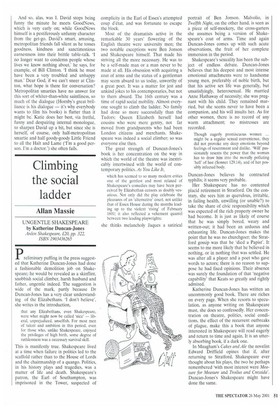Climbing the social ladder
Allan Massie
UNGENTLE SHAKESPEARE by Katherine Duncan-Jones Arden Shakespeare, £20, pp. 322, ISBN 1903436265 Preliminary puffing in the press suggested that Katherine Duncan-Jones had done a fashionable demolition job on Shakespeare; he would be revealed as a skinflint, snobbish social climber, harsh husband and father, ungentle indeed. The suggestion is wide of the mark, partly because Dr Duncan-Jones has a very clear understanding of the Elizabethans. 'I don't believe', she writes in the introduction,
that any Elizabethans. even Shakespeare, were what might now be called 'nice' — liberal, unprejudiced, unselfish. For most men of talent and ambition in this period, even for those who, unlike Shakespeare, enjoyed the privileges of high birth, some degree of ruthlessness was a necessary survival skill.
This is manifestly true. Shakespeare lived at a time when failure in politics led to the scaffold rather than to the House of Lords and the chairmanship of a quango. Politics, in his history plays and tragedies, was a matter of life and death. Shakespeare's patron, the Earl of Southampton, was imprisoned in the Tower, suspected of complicity in the Earl of Essex's attempted coup d'etat, and was fortunate to escape the block.
Most of the dramatists active in the remarkable 30 years' flowering of the English theatre were university men; the two notable exceptions were Ben Jonson and Shakespeare himself. That made his striving all the more necessary. He was to be a self-made man or a man never to be made at all. His obsession with acquiring a coat of arms and the status of a gentleman may seem absurd to us today, unworthy of a great poet. It was a matter for jest and unkind jokes to his contemporaries, but not to them absurd. The 16th century was a time of rapid social mobility. Almost everyone sought to climb the ladder. No family had done so more successfully than the Tudors: Queen Elizabeth herself had cousins who were mere gentry, not far moved from grandparents who had been London citizens and merchants. Shakespeare was indeed a social climber; so was everyone else then.
The great strength of Duncan-Jones's book is her concentration on the way in which the world of the theatre was inextricably intertwined with the world of contemporary politics. As You Like It,
which has seemed to so many modern critics one of the gentlest and most relaxed of Shakespeare's comedies may have been perceived by Elizabethan censors as doubly vexatious. Not only did the play celebrate the pleasures of an 'alternative' court, not unlike that of Essex House during the months leading up to the violent 'rising' of February 1601: it also reflected a vehement quarrel between two leading playwrights:
she thinks melancholy Jaques a satirical portrait of Ben Jonson. Malvolio, in Twelfth Night, on the other hand, is seen as a piece of self-mockery, the cross-garters she assumes being a version of Shakespeare's coat of arms. Time and again Duncan-Jones comes up with such acute observations, the fruit of her complete immersion in the period.
Shakespeare's sexuality has been the subject of endless debate. Duncan-Jones believes that his deepest and most intense emotional attachments were to handsome young men, preferably of noble birth, but that his active sex life was generally, but unsatisfyingly, heterosexual. He married Anne Hathaway of necessity; she was pregnant with his child. They remained married, but she seems never to have been a companion, and his will insults her. As for other women, there is no record of any warm attachment; no mistresses are recorded.
Though eagerly promiscuous women ... might be a regular sexual convenience, they did not provoke any deep emotions beyond feelings of resentment and dislike. 'Will' passionately resents the power that the woman has to draw him into the morally polluting 'hell' of lust (Sonnet 129.14), and of her possibly infected body.
Duncan-Jones believes he contracted syphilis; it seems very probable.
Her Shakespeare has no contented placid retirement in Stratford. On the contrary, she sees him as querulous, irritable, in failing health, unwilling (or unable?) to take the share of civic responsibility which was expected of the rich property owner he had become. It is just as likely of course that he was simply bored, weary and written-out; it had been an arduous and exhausting life. Duncan-Jones makes the point that he was no churchgoer: the Stratford gossip was that he 'died a Papist'. It seems to me more likely that he believed in nothing, or in nothing that was settled. He was after all a player and a poet who gave words to actors; there is no reason to suppose he had fixed opinions. Their absence was surely the foundation of that 'negative capability' that Keats so greatly and rightly admired.
Katherine Duncan-Jones has written an uncommonly good book. There are riches on every page. When she resorts to speculation, as anyone writing on Shakespeare must, she does so confessedly. Her concentration on theatre, politics, social conditions, the effect of the recurrent outbreaks of plague, make this a book that anyone interested in Shakespeare will read eagerly and return to time and again. It is an utterly absorbing book, if a dark one.
In Maugham's Cakes and Ale the novelist Edward Driffield opines that if, after returning to Stratford, Shakespeare ever thought about his plays, the two he perhaps remembered 'with most interest were Measure for Measure and Troilus and Cressida'. Duncan-Jones's Shakespeare might have done the same.


















































































 Previous page
Previous page